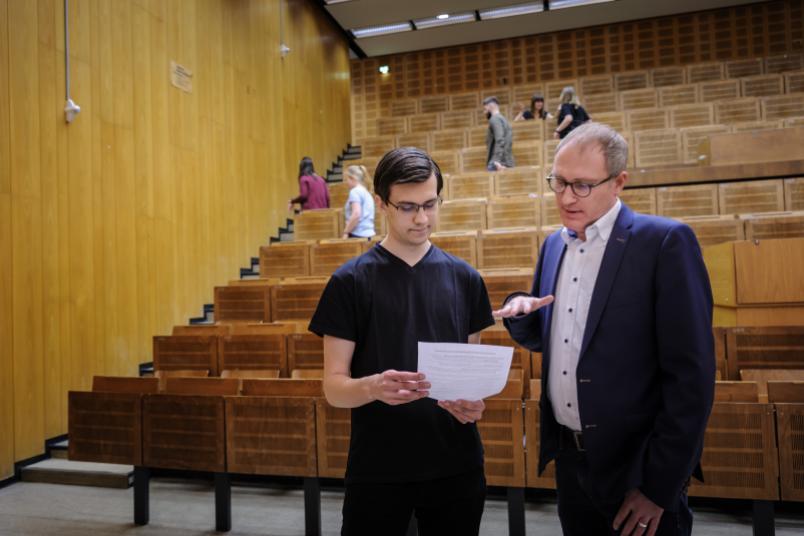
Research on Learning and Instruction
The right strategies help reduce university dropout rates
In engineering sciences, the first semesters in particular are an endurance test for students. The dropout rates are high. Still, this might yet change.
Approximately 40 per cent of students drop out of their engineering degree in the first semester. Many students cite exams in the first two semesters as the greatest stress factor. Professor Joachim Wirth and his colleague Dr. Julia Waldeyer from the RUB Chair of Research on Learning and Instruction intend to find out which factors affect study performance in engineering sciences. The psychologists are focusing on investigating the role of so-called resource management strategies. Their analyses have shown that individuals who know how to use strategies that facilitate good learning have better chances to complete their degree. Rubin, the RUB’s science magazine, has published a report on their research.
Strategies can be learned and practised
Prominent resource management strategies are workplace organization, time management, the motivation to learn, the option to seek help in case of problems, and the willingness to invest effort even when faced with difficulties. “We are very much interested in such strategies, because strategies can be learned and practised,” says Joachim Wirth. “This is what distinguishes them from stable personal attributes, such as intelligence. As far as the latter is concerned, there’s not much we can do about it in the short term. Whereas learning strategies can be tweaked and adjusted within a relatively short period of time. If we knew more about how they contribute to good study performance, we could make life easier for many students, especially at the beginning of their degree course.”
Novel test method
In order to identify in what way learning problems at the beginning of the civil engineering degree are caused by deficiencies with regard to resource management strategies, Julia Waldeyer has devised a novel psychological test instrument called “Resource Management Inventory” (Remi). First-year students in the fields of civil engineering and educational research took part in the pilot study. “We have used the humanities students as our control group, because at less than 20 per cent the dropout rate there is much lower. We wanted to know if educational research students are perhaps much more adept at utilising resource management strategies,” as Waldeyer explains her approach. What makes her study unique, moreover, is that she did not merely rely on the test participants’ self-assessment regarding their study performance; rather, she was granted permission by the students to access their official data at the examination offices.
Exam results can be predicted
It emerged that the participants who were more adept at applying resource management strategies were also the ones who achieved better academic results. The same still applied even after the researchers included other factors that may result in good grades in their calculations. “We have, for example, considered the A-level results, which are a strong predictor of study performance. Stable personal attributes such as cognitive skills were likewise taken under consideration,” stresses Joachim Wirth. “Still, we calculated that the deployment of resource management strategies is a significant factor affecting overall performance. Accordingly, we are able to predict and explain the performance of individual students in exams, provided we know how well or how poorly they employ resource management strategies.” This implies that if students were taught how to use those strategies, they would presumably perform better in their degree courses.
A question of gender?
Another significant outcome of the study is that civil engineering students had overall poorer Remi results than educational research students. Julia Waldeyer can only speculate why: “It’s conceivable that the women and men who study educational research attended advanced courses in related subjects at school, thus acquiring the relevant competencies prior to their degree course. But gender difference might be a reason, too. Educational research is a female-dominated field, whereas in civil engineering men clearly outnumber women. This, too, is a question we intend to pursue in follow-up studies.”